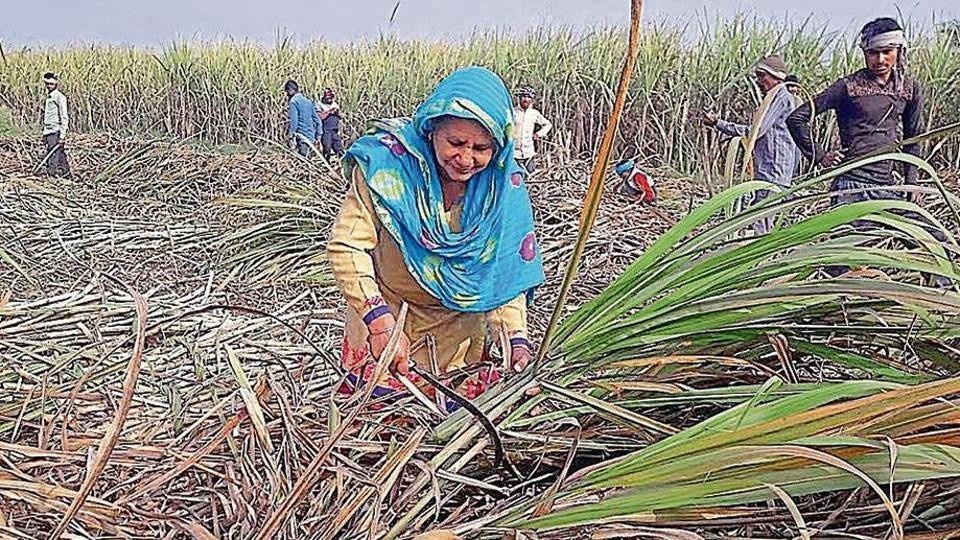A woman works in her fields in Sundana village of Rohtak district.(Manoj Dhaka/ht file)
Prime Minister Narendra Modi has asked the agriculture ministry to enrol at least 10 million farmers for Kisan Credit Cards by February 23, expressing concern over the slow progress of a programme aimed at increasing access of cultivators to formal sources of lending, according to two officials with direct knowledge of the matter.
The officials, who asked not to be named, added that Modi said he was open to attending an event to distribute cards to farmers, but after US President Donald Trump’s visit to India. The US president is set to visit India on February24-25.
Farmers rely on agricultural credit to purchase various inputs, from fertilizers to irrigation equipment. Lack of adequate access to institutional credit means farmers often take out usurious loans from private lenders.
In a meeting held earlier this month at the Prime Minister’s Office, Modi , according to the two officials cited above, said it was a “matter of concern” that all farmers under the PM-KISAN scheme do not have Kisan Credit Cards.
PM-KISAN is a flagship income support scheme of the government for all landholding farmers, under which registered cultivators get cash transfers of Rs 6,000 a year in three instalments.
The PM said the farm ministry already has details of 85 million farmers under PM-KISAN, and that not all of them have been provided Kisan Credit Cards.
The farmers’ database generated by PM-KISAN, which makes digital cash transfers, is a first. The government has discovered its utility in managing various farm policies. It plans to use this database for more targeted delivery of schemes, including agricultural credit.
Following the PM’s directive, the agriculture ministry has held seven video conferences with state officials and other ministries to chalk out a strategy to distribute 10 million credit cards shortly. It has also reached out to the rural development ministry to tap 5.4 million self-help groups to help the enrolment effort.
Budget 2020-21 has set a formal lending target of Rs 15 lakh crore forfarmers. Under revised guidelines, standard security requirements, such as hypothecation of crops, now do not apply to small loans of up to Rs 1 lakh. This is also applicable to loans availed through the Kisan Credit Card scheme, which allows land-holding farmers to meet short-term credit requirements for cultivation.
Robust farm GDP growth depends on investment and capital formation, or asset creation, in the agriculture sector. According to a Reserve Bank of India report, a 10% increase in institutional credit would increase a farming household’s investment by close to 3%. However, small farmers tend to depend more on informal credit.
Under the Kisan Credit Card scheme, small farmers can also avail a flexible limit of between Rs 10,000 and Rs 50,000 for post-harvest warehouse needs and setting up small-scale dairy and poultry farms. For this, branch managers have been empowered to disburse the amount based on their assessment and without linking it to the value of the farmers’ land.
Agriculture ministry officials are keen to tap self-help groups for the purpose of distributing cards, for which it has approached the rural development ministry. “Their calculation is that even if one woman from 5.4 million self-help groups can get a farmer enrolled for the Kisan Credit Card scheme, the ministry can straightaway enrol 5.4 million beneficiaries,” a rural development ministry official said on condition of anonymity.
This year’s Economic Survey pointed out that challenges including credit, insurance coverage and irrigation needs to be addressed for the government to realize its stated objective of doubling farm incomes.
“The agricultural credit flow target for 2019-20 has been fixed at Rs 13,50,000 crore, and till November 30, 2019, a sum of Rs 9,07,843.37 crore has been disbursed. The regional distribution of agricultural credit in India is highly skewed. It is observed that credit is low in North Eastern, Hilly and Eastern States,” the survey said.
Source: Hindustan Times








Comments (0)